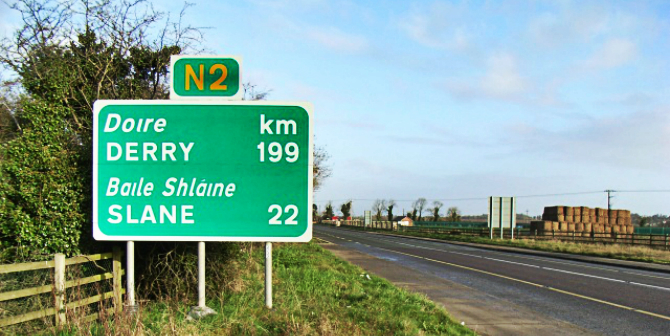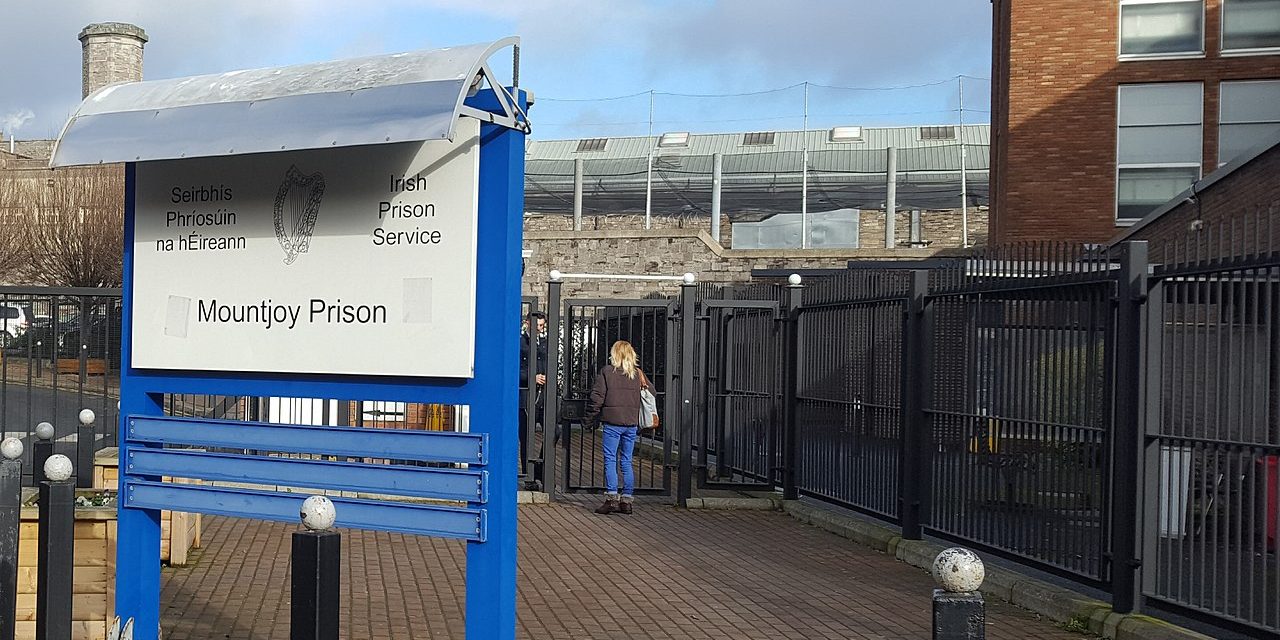

Whether at 11pm on 29 March or at a later date, in the absence of the Withdrawal Agreement being approved or Article 50 being revoked, the UK and the EU will find themselves in a ‘no deal scenario’. Given that the joint UK and EU commitment to avoid a hard Irish border was behind the backstop that proved so unpalatable for many MPs, it is worth considering what a crash-out Brexit would look like in the Irish border region. A ‘hard’ border between Northern Ireland outside the EU and Ireland within the EU will be felt in ways that go far beyond tariffs and quotas, argue Billy Vaughan and Katy Hayward (Queen’s University Belfast).
The UK government has published its fairly sketchy plans for ‘avoiding a hard border in Northern Ireland’ for such an eventuality. It concentrates primarily on the subject of customs controls and proposes, in effect, that there will be no customs controls on the Irish border. This means that goods crossing the Irish border into Northern Ireland will not be subject to tariffs, quotas or other controls. It is an ‘as you were’ effort, hoping that the rest of the UK, the EU and, indeed, the World Trade Organisation will not hasten to point out that the UK cannot make a unilateral decision to leave part of its border swinging wide open. It seems that the realities and responsibilities of being a ‘third country’ are particularly difficult to manage when it comes to Northern Ireland [who knew?].
Of course, customs controls are but one small part of what happens at a border. The purpose of the Protocol on Ireland/Northern Ireland in the Withdrawal Agreement is to protect the current openness of the Irish border by covering cross-border cooperation and regulatory alignment, as well as customs.The mapping exercise conducted by officials from the UK, Ireland and European Commission identified 156 areas of north/south cooperation on the island of Ireland.
So what do we know will happen to a range of areas of everyday life for people on the island of Ireland, particularly in the Irish border region, in the event of a No Deal? We have analysed UK technical notices, the Irish Brexit Omnibus Bill (which completed its passage through the Oireachtas on 13 March with cross-party support), and third-party statements and documents. We have found a mixture of reassurance, omissions and ambiguities when it comes to knowing what to expect come No Deal Exit day.

What should be OK: The power should stay on
Electricity
One of the most outlandish stories on the topic of No Deal preparation for Northern Ireland has been that UK officials have considered commandeering military equipment to put generators on boats in the Irish Sea to ensure continuity in electricity supply into Northern Ireland. The potential problem arises from the fact that some of Northern Ireland’s electricity supply comes from the Republic of Ireland and there have been concerns that this power might be shut off in the event of a ‘no deal’ leaving key elements of the Single Electricity Market without any legal basis. An Irish Minister recently told a government committee that they are ‘not anticipating blackouts or power outages on either side of the border in the event of a no-deal Brexit’. This was put on firmer footing by the Omnibus Bill, in which the Irish government has amended the 1999 Electricity Regulation Act, allowing a one year period where licences can be modified faster than the current ‘modification and appeal’ process. This will enable all members of the Single Electricity Market to continue to trade pending further bilateral negotiations on the issue.
Broadcasting
Under current ‘country of origin’ rules, broadcasts and Video On Demand services are only subject to regulation by the country they originated from, but can still be broadcast across the EU. After a no deal, this will end and the UK will become an outside ‘third country‘. To address this, the UK government has recently introduced legislation to deal with the process of withdrawing from the Audiovisual Media Services Directive (AVMSD), which governs broadcasting in the EU. This will mean that any television service that is available in the UK is required to be licensed by Ofcom. Applied to Northern Ireland, this will mean, for example, that the Irish national broadcaster RTÉ will come under the regulation of Ofcom; conversely, BBC broadcasts in ROI will be regulated by the Broadcasting Association of Ireland. But there is no reason why the shows shouldn’t go on after exit day.
Banking
It is not anticipated that financial services will experience any disruption in the event of ‘no deal’, as the UK government has taken steps to ensure that (i) the same rules will apply to financial services in the UK after exit, and (ii) to enable financial services providers based in the EU to continue providing services in the UK for a minimum of three years after EU Exit. Insurance and financial services between the UK and Ireland have been shored up in the Irish Omnibus Bill, which provides for a time-limited period within which further arrangements will be negotiated. As such, the way most people living in Northern Ireland might be affected by a ‘no deal’ Brexit is in that the cost and time involved in electronic payments in euro may increase. That said, the UK government has warned that there may be difficulties faced by those intending to use a bank card or other financial service from a UK-based firm in Ireland after exit day.
Common Travel Area
As is often noted, the Common Travel Area was formed before either the UK or Ireland were members of the EU. Their being outside the Schengen Area simplifies matters in relation to immigration rules post-Brexit and does create quite a bit of space for bilateral arrangements. This has been exploited in full by both sides in the months leading up to exit day. In particular, it means that reciprocal rights for Irish and UK citizens operate separately and alongside those rights afforded to EU nationals. Both governments have been keen to put these rights into formal legislation as it has a serious impact on so many people north and south. In terms of social welfare and arrangements for working people, the current state of affairs is expected to continue without change in the short term following a no-deal Brexit.
Also reassuring to many is that the rights of students to receive loans and grants on either side of the border has been addressed in the Irish Omnibus Bill. Part 5 in the legislation protects the payment of education grants to eligible students studying in the UK and UK nationals studying in the UK under the SUSI scheme. The UK has concentrated its advice more on the older generation, assuring British nationals in Ireland that they will be able to collect their UK state pensions, child benefit and disability benefits after Brexit.
Where there’s some uncertainty: Keeping the shelves stocked and the traffic moving
Commercial traffic
Regulations were passed in Parliament in November 2018 which confirmed that the UK government does not require Northern Ireland (NI) hauliers to carry permits when on international journeys to or through the Republic of Ireland (ROI). This is in keeping with the UK government’s position in the Road Haulage and Trailer Registration Act that avoids introducing permits on the island of Ireland without the consent of the Government of Ireland. Thus, permits for hauliers with a NI operator’s licence will not need to obtain any further documentation to drive in the ROI. However, any hauliers from Great Britain driving in the ROI will need to apply for an ECMT permit.
Private cars
And then there is the non-commercial traffic. Some 1.85 million private car journeys are made across the Irish border every month. In the event of a ‘no deal’, all these drivers will need to double check that they are compliant with the new rules that will apply: and these rules differ widely according to the type of licence, who holds it and which side of the border they live on.
When it comes to private licences, ‘some’ drivers with ‘certain types’ of licences ‘may’ need an International Driving Permit (IDP) in addition to their UK licence to drive legally in the EU after Brexit; this could apply to those crossing the Irish border. The UK government states that UK drivers who wish to drive in the Republic may require a ‘1949’ type IDP. According to the Irish Driver Licencing Service, any Northern Ireland residents driving in the Republic for visits will not need an IDP. However, UK licence holders living in the Republic will need to exchange their licence before exit day, as they have a right to do (though perhaps they would be wise to note that processing time takes up to 10 days). For ROI licence holders in NI, the UK government has committed to recognise EU licences, so there are no foreseen problems.
Of course, you need more than a valid license to drive legally. In terms of insurance, anyone who drives their Irish registered motor vehicle in Northern Ireland or the rest of the UK will require a Green Card to demonstrate to the authorities in Northern Ireland or anywhere else in the UK that they have valid motor insurance cover in place.
Public transport
Much concern about the potential for disruption in public transport in a ‘no deal’ Brexit rests on the licences of the train and bus drivers. According to the EU Commission, licenses and certificates for train and bus drivers issued in the United Kingdom will no longer enjoy automatic recognition in the EU27. This in principle could cause major disruption to the cross-border rail and bus services, which are staffed by a combination of drivers from ROI and UK (NI). Currently, the EU advises that companies prepare for this and make appropriate preparations in terms of certification.
Passengers on cross-border bus services will continue to be protected by the EU regulation on bus and coach passengers’ rights, which will be brought into UK law. The Irish Omnibus Bill also gives new powers to the National Transport Authority to effectively regulate bus transport on a cross-border basis. This includes bus companies that are licenced in Northern Ireland. In fact, the most noticeable change that passengers are likely to experience in a ‘no deal’ scenario is more passport checks taking place on cross-border rail and bus services, possibly in symbolic as much as efficient gestures of border control.
The great unknowns: Hitting where it hurts
Cross-border healthcare
One of the most lauded benefits of cross-border cooperation in recent years has been the sharing of health services, particularly in specialist provision. There have been concerns that restrictions on the movement of health care workers, medical devices, medicines and information on patients across the border could be at risk in a ‘no deal’ Brexit. Some of these areas are still unclear. In its Brexit Omnibus Bill, the Irish government has given powers to the Minister for Health to made orders to continue the state of affairs that currently exist under the Common Travel Area provisions. This would include access to health services in the UK for ROI residents, access to health services in the ROI by persons from the UK, and reimbursement arrangements. For its part, the UK government guidance provides advice in relation to specific issues like medicines and treatment, but lacks detail especially in relation to Northern Ireland specifically. Information on treatment availability, for instance, is only available for England. And UK nationals living in ROI have been warned that their access to healthcare is likely to change in the event of a ‘no deal’ and told that their EHIC card will no longer be valid from the 29 March 2019.
Mobile roaming
In the event of a no deal, the costs that EU mobile operators would be able to charge UK operators for providing roaming services would no longer be regulated after March 2019. This would mean that surcharge-free roaming when travelling to the EU could no longer be guaranteed. This would also mean the sudden loss of the generous free data roaming provisions brought in under EU ‘roam like at home’ regulations. This will cause massive disruption for those in Northern Ireland who travel across the border regularly, as they will be subject to completely unregulated new roaming costs. However, UK Culture Secretary Jeremy Wright has stated that the government intends on imposing a £45-a-month limit on the amount that customers could be charged for using mobile data abroad.
This is small comfort for those in the Irish border region, some of whom can incur mobile roaming charges by texting while walking from their kitchen to their living room. The UK technical notice does recognise the phenomenon of ‘inadvertent roaming’, where a mobile signal in a border region is stronger from the country across the border. It says that, in the event of no deal, operators must ‘take reasonable steps to protect their customers from paying roaming charges for inadvertently accessed roaming services’ but this is far from solid reassurance that this won’t happen.
Data
If the UK leaves the EU in March 2019 with no agreement in place regarding future arrangements for data protection, there would be no immediate change in the UK’s own data protection standards. This is because the Data Protection Act 2018 would remain in place and the EU Withdrawal Act would incorporate the GDPR into UK law to sit alongside it. Data transfer from Ireland to the UK, however, will be more complicated. In the event of a ‘no deal’ Brexit, the UK will become a ‘third country’ and personal data transfers from Ireland to the UK will require the implementation of legal safeguards by the Irish-based organisations and bodies that are transferring the personal data. This could well have repercussions for all organisations trading or doing any other kind of business or correspondence with entities in the UK, including Northern Ireland. The issue of data-sharing rests at the heart of a huge amount of services that people rely upon on their daily lives, from policing to banking to healthcare. Although an invisible aspect of cross-border cooperation, it could well prove to be one of the most disruptive aspects of re-bordering that will occur in the event of a ‘no deal’ Brexit.
This is but a broad overview of only a few of the cross-border dimensions of daily life in the Irish border region that could be directly affected by a ‘no deal’ Brexit. We see that, whilst there is provision and clarity in some areas, there is also a great deal of uncertainty and confusion in others. There are many loose ends to be tied and decisions to be made. The safety net being prepared for the cliff edge is full of loose ends and gaping holes. And that cliff edge could be reached in just a matter of days.
To the best of the authors’ knowledge, information was correct at time of publication, but readers are advised to follow updates from the UK government, Irish government and EU Commission for latest developments. The BorderPeople Brexit Hub is also particularly helpful for ‘frontier workers’ and those living in the border region.
This post represents the views of the authors and not those of the Brexit blog, nor the LSE. © Copyright JP and licensed for reuse under this Creative Commons Licence.
Billy Vaughan is a student on the MA in Global Security and Borders at Queen’s University Ireland and a recipient of a Universities Ireland North/South postgraduate scholarship 2018/19 [bvaughan03@qub.ac.uk].
Katy Hayward is Reader in Sociology & Fellow of the Senator George J. Mitchell Institute for Global Peace, Security and Justice at Queen’s University Belfast.






